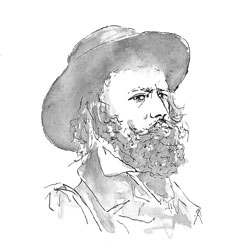‘Tears, idle tears’: An Introduction to Reading Tennyson
In these linked pages graduate editor Simon Calder looks at the different ways in which one short poem can be read and interpreted. By reading through the approaches taken by several important critics, you'll get a number of perspectives on 'Tears, idle tears', but you'll also be thinking over questions relevant to many, if not all, poems. At the end there's a chance to choose one of the approaches that seems to work best for you, and to offer comments on your own perspective on the poem.
'Tears, idle tears, I know not what they mean'
Tears, idle tears, I know not what they mean,
Tears from the depth of some divine despair
Rise in the heart, and gather to the eyes,
In looking on the happy Autumn-fields,
And thinking of the days that are no more.Fresh as the first beam glittering on a sail,
That brings our friends up from the underworld,
Sad as the last which reddens over one
That sinks with all we love below the verge;
So sad, so fresh, the days that are no more.Ah, sad and strange as in dark summer dawns
The earliest pipe of half-awaken'd birds
To dying ears, when unto dying eyes
The casement slowly grows a glimmering square;
So sad, so strange, the days that are no more.Dear as remember'd kisses after death,
And sweet as those by hopeless fancy feign'd
On lips that are for others; deep as love,
Deep as first love, and wild with all regret;
O Death in Life, the days that are no more.
'Tears, idle tears' was published in 1847, when it first appeared as a lyric embedded within Tennyson's longer poem The Princess: a Medley. In the opening line of the poem Tennyson's narrator says that they do not know what their own idle tears mean; what do you think they mean by the end? Over the course of the next few pages we'll consider what four different literary critics have said about the meaning of the poem, and think about whether or not to agree. We'll come across some contrasting ideas about how to read a poem which we should try to keep in mind whenever we're reading poetry.
Click here to proceed to the rest of this discussion of 'Tears, idle tears'.
